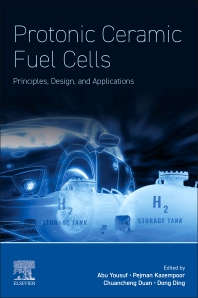Books in Energy storage
Books in Energy storage

Protonic Ceramic Fuel Cells
Principles, Design, and Applications- 1st Edition
- September 1, 2026
- Abu Yousuf + 3 more
- English

Metal-ion Capacitors
Fundamentals, Materials, Characterization, and Developments- 1st Edition
- September 1, 2026
- Debasish Sarkar
- English

Energy Storage and Hydrogen Integration for Sustainable Solutions
- 1st Edition
- September 1, 2026
- Mousa Marzband + 1 more
- English

Advances in Thermal Energy Storage Systems
Methods and Applications- 3rd Edition
- August 1, 2026
- Luisa F. Cabeza
- English

Therma Plasma-coupled Carbon Capture Utilization and Storage
Unlocking the Potential of Thermal Plasma- 1st Edition
- June 1, 2026
- Vineet S. Sikarwar + 2 more
- English

Absorption Thermal Energy Storage
Fundamentals and Advances- 1st Edition
- March 31, 2026
- Wei Wu + 2 more
- English

Hydrogen Fuel Cell Electric Vehicles
Fundamentals, Design, Performance, Applications, and AI-Driven Commercialization- 1st Edition
- March 9, 2026
- Morteza Nazari-Heris + 2 more
- English

Smart Safety Management of Energy Storage Batteries
- 1st Edition
- March 1, 2026
- Shunli Wang + 6 more
- English

Navigating a Sustainable Future with Phase Change Materials for Energy Storage
- 1st Edition
- January 28, 2026
- Adarsh Kumar Pandey + 1 more
- English

Application of Phase Change Materials in Energy Storage and Conversion Systems
- 1st Edition
- January 23, 2026
- Mehdi Mehrpooya + 2 more
- English